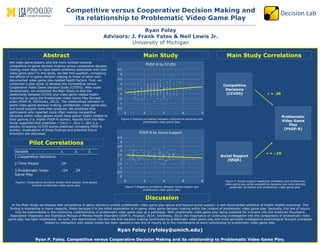Melden
Teilen

Empfohlen
Empfohlen
Weitere ähnliche Inhalte
Ähnlich wie Ryan_poster4
Ähnlich wie Ryan_poster4 (20)
Running Head VIDEO GAME VIOLENCE AND CHILDREN .docx

Running Head VIDEO GAME VIOLENCE AND CHILDREN .docx
Surface level observations of video game addiction and people .docx

Surface level observations of video game addiction and people .docx
Does playing video or computer games have beneficial effects.docx

Does playing video or computer games have beneficial effects.docx
INTERPERSONAL RELATIONS AND GROUP PROCESSESEffects of Pros.docx

INTERPERSONAL RELATIONS AND GROUP PROCESSESEffects of Pros.docx
Study of relationship between the games and the aggression in people lifestyle

Study of relationship between the games and the aggression in people lifestyle
CDC’s Program to Incubate Games for Public Health Awareness

CDC’s Program to Incubate Games for Public Health Awareness
Running Head DOES VIOLENCE IN VIDEO GAMES INCREASE AGGRESSIO.docx

Running Head DOES VIOLENCE IN VIDEO GAMES INCREASE AGGRESSIO.docx
Peer Response Unit 5 LifespanResponse Guidelines for both peer r.docx

Peer Response Unit 5 LifespanResponse Guidelines for both peer r.docx
Qualitative Research on Computer Gaming (Practical Research 1)

Qualitative Research on Computer Gaming (Practical Research 1)
Ryan_poster4
- 1. Competitive versus Cooperative Decision Making and its relationship to Problematic Video Game Play Ryan Foley Advisors: J. Frank Yates & Neil Lewis Jr. University of Michigan Are video game players who are more inclined towards competitive in-game decision making versus cooperative decision making more likely to have health problems associated with their video game play? In this study, we test this question, comparing the effects of in-game decision making to those of other well- documented video game play-related health factors. First, we conducted a pilot study to develop the Competitive versus Cooperative Video Game Decision Scale (CCVDS). After scale development, we conducted the Main Study to test the relationship between CCVDS and video game related health outcomes by using the Problematic Video Game Play Revised scale (PVGP-R; Tolchinsky, 2013). The relationships between in- game video game decision making, problematic video game play, and social support were then analyzed. We predicted that participants who reported more often making competitive decisions within video games would have poorer health related to their gaming (i.e. higher PVGP-R scores). Results from the Main Study supported this prediction r (261) = .20 p = .001 (i.e. players increasing CCVDS scores predicted increasing PVGP-R scores). Implications of these findings and potential future directions are discussed. In the Main Study we showed that competitive in-game decisions predict problematic video game play above and beyond social support, a well documented predictor of health related outcomes. This finding is interesting in many respects, firstly because it is the initial exploration of in-game video game decision making within the context of problematic video game play. Secondly, this line of inquiry may be instrumental in the continuing understanding of problematic video game play as a pathology. With problematic video game play being explored for inclusion into the American Psychiatric Association Diagnostic and Statistical Manual of Mental Health Disorders (DSM V; Pouliout, 2014; Tolchinsky, 2013) the importance of continuing investigation into the components of problematic video game play has been heightened. As such, this examination into the role that decision making contributes to problematic video game play and more generally maladaptive psychological thought processes related to interaction with digital media has been opened a new line of inquiry as to the mechanisms at work contributing to problematic video game play. Ryan Foley (ryfoley@umich.edu) Ryan P. Foley. Competitive versus Cooperative Decision Making and its relationship to Problematic Video Game Play. Main Study Competitive Decisions (CCVDS) Social Support (SSQ6) r = .20 r = -.15 Figure 4: Social support negatively correlates with problematic video game play while competitive decisions are more strongly positively correlated with problematic video game play. Decision Lab Variable 1. 2. 3. 1.Cooperative Decisions - 2.Time Played .24 - 3.Problematic Video Game Play -.04 .29 - 0.5 1 1.5 2 2.5 3 3.5 4 4.5 1 2 3 4 5 PVGP-R by CCVDS 0 0.5 1 1.5 2 2.5 3 3.5 4 4.5 0 2 4 6 8 PVGP-R by Social Support Figure1: Cooperative decisions predict time played, time played predicts problematic video game play. Figure 2:Positive correlation between competitive decisions and problematic video game play. Figure 3:Negative correlation between social support and problematic video game play. Problematic Video Game Play (PVGP-R) Abstract Main Study Correlations Discussion Pilot Correlations